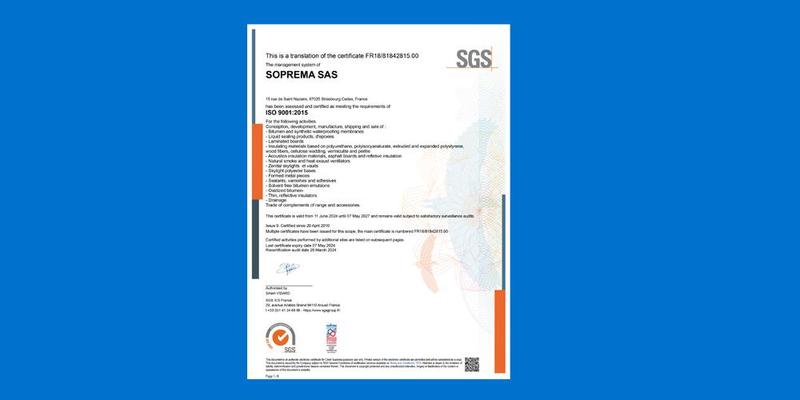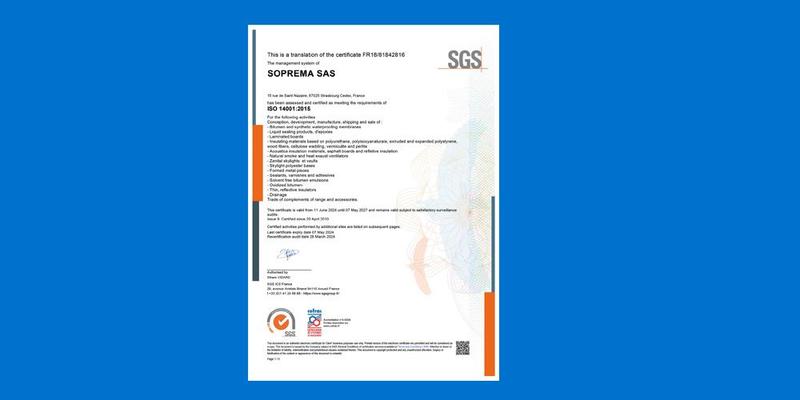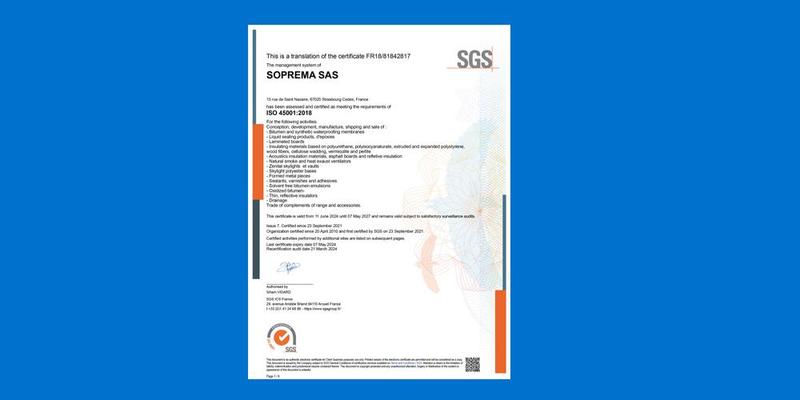certifications


CERTIFICATION UNI-EN ISO 9001-2015
CERTIFICAtion ISO 9001
Soprema has set itself the goal of guaranteeing the quality of its products to fully satisfy the application needs.
Commitment to research and continuous investments to adapt and optimize the entire company operating structure have allowed Soprema to become a reference company in the national market. The conquest of interesting positions on foreign markets, with particular reference to the European ones, known for their needs in terms of quality, confirms the validity of the proposed offer.
The achievement in 1996 of the Quality System certification according to the ISO 9001 standard intended as recognition of the consistency of the company policy, and the subsequent renewal in 2003 as UNI-EN ISO 9001-2000, were the logical consequence.
The Quality System has been adapted to the new UNI EN ISO 9001:2015 standard

CERTIFICAtion uni en ISO 14001-2015
CERTIFICAtion ISO 14001
Soprema complements the ISO 9001-2015 Certification with the prestigious ISO 14001-2015 Certification, confirming Soprema's commitment to minimizing the environmental impact of its production processes.
ISO 14001-2015 is an international standard of a voluntary nature which indicates how an effective Environmental Management System must be developed.
The ISO 14001-2015 Certification concretely demonstrates the Company's commitment to minimizing the environmental impact of processes, products and services and certifies the reliability of the Environmental Management System applied. The law requires the Company to commit itself by defining its environmental objectives and targets in writing and publicly, and to implement an Environmental Management System that allows them to be achieved.
The ISO 14001-2015 standard leaves the Company the choice of which and how many improvement objectives to pursue, also according to the economic possibilities and the technological level already existing in the Company.
The main elements indicated in the standard are: environmental policy; planning; implementation and operation; controls and corrective actions; management review.
The Environmental Management System envisaged by ISO 14001-2015 is based on legislative compliance, continuous improvement and pollution prevention.
Purpose of the Certification
An Environmental Management System allows you to:
- have a structured approach in defining environmental objectives and in identifying the tools necessary to achieve them
- identify environmental risks and opportunities for improvement
- ensure compliance with all regulatory requirements relevant to the environment
- reduce costs related to energy consumption, waste management and raw materials
- start a process of continuous improvement of environmental performance
- increase the value of your company on the market, starting from a serious analysis of your environmental problems, whether they are of a legislative, technical or managerial nature

CERTIFICation UNI EN ISO 45001-2018
CERTIFICAtion iso 45001
Management systems for occupational health and safety.
The UNI ISO 45001 standard of 2018 "Occupational health and safety management systems" is the first international standard to define the minimum standards of good practice for the protection of workers all over the world. It establishes a framework for improving safety, reducing risks in the workplace and improving the health and well-being of workers, thus enabling the organization to increase its health and safety performance.
The management of occupational safety included in the corporate strategy and integrated with quality and environmental policies, improves performance and projects towards a new model of sustainable competitiveness.
From March 2021, the UNI ISO 45001 standard replaced BS OHSAS 18001 as the only reference for the certification of management systems for health and safety in the workplace.
Compared to the OHSAS 18001 standard, the ISO 45001 standard places greater emphasis on the role of the various subjects involved in the system, from Top Management, called to exercise a leadership role, to interested parties, defined as the people or organizations that can exercise an influence on decisions or activities or who are influenced by them or perceive themselves to be influenced by them.
A relevant internal interested party is made up of the workers: towards them, the organization activates consultation and participation processes. Consultation is prior to the decision-making process and pertains to the collection of workers' points of view and requests, while participation consists above all in the direct involvement of workers in the decision-making process.
Among the external interested parties, customers and suppliers are of particular importance, to whom various references are made, especially in the system planning, risk assessment and risk control phases.
In setting up the new ISO 45001 standard, attention was paid to a few cornerstones:
- Greater integration with ISO 9001 and ISO 14001;
- Attention to the context and to the assessment of risks and opportunities;
- Reference to the company business;
- Involvement and awareness of all parties involved (management, operators, interested parties);
- Greater involvement and consideration of outsourced processes.
